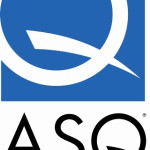- Branża: Quality management
- Number of terms: 21751
- Number of blossaries: 0
- Company Profile:
American Society for Quality (ASQ) is a global community of quality management professionals. Established in 1946 as the American Society for Quality Control (ASQC) in response to the need to sustain the many quality-improvement techniques used manufacturing during World War II, the organization ...
Anything that limits a system from achieving higher performance or throughput; also, the bottleneck that most severely limits the organization’s ability to achieve higher performance relative to its purpose or goal.
Industry:Quality management
A term referring to the Pareto principle, which was first defined by J. M. Juran in 1950. The principle suggests most effects come from relatively few causes; that is, 80% of the effects come from 20% of the possible causes.
Industry:Quality management
The selection of goals, projects to achieve the goals, designation of people and resources for project completion and establishment of project metrics.
Industry:Quality management
Inspection in accordance with a sampling plan that has stricter acceptance criteria than those used in normal inspection. Tightened inspection is used in some inspection systems as a protective measure when the level of submitted quality is sufficiently poor. The higher rate of rejections is expected to lead suppliers to improve the quality of submitted product. Note: The criteria for determining when quality is “sufficiently poor” must be defined in objective terms for any given inspection system.
Industry:Quality management
The activity of discovering the cause(s) of quality deficiencies; the process of investigating symptoms, collecting and analyzing data, and conducting experiments to test theories to determine the root cause(s) of deficiencies.
Industry:Quality management
Another term for COPQ. It is considered by some to be synonymous with COPQ but is considered by others to be unique. While the two concepts emphasize the same ideas, some disagree as to which concept came first and which categories are included in each.
Industry:Quality management
Confidence a supplier’s product or service will fulfill its customers’ needs. This confidence is achieved by creating a relationship between the customer and supplier that ensures the product will be fit for use with minimal corrective action and inspection. According to Joseph M. Juran, nine primary activities are needed: 1. define product and program quality requirements; 2. evaluate alternative suppliers; 3. select suppliers; 4. conduct joint quality planning; 5. cooperate with the supplier during the execution of the contract; 6. obtain proof of conformance to requirements; 7. certify qualified suppliers; 8. conduct quality improvement programs as required; 9. create and use supplier quality ratings.
Industry:Quality management
A technique for production screening that rapidly exposes process or production flaws in products. Its purpose is to expose a product to optimized production screens without affecting product reliability. Unlike HALT, HASS uses nondestructive stresses of extreme temperatures and temperature change rates with vibration.
Industry:Quality management
All activities, both value added and nonvalue added, required to bring a product from raw material state into the hands of the customer, bring a customer requirement from order to delivery and bring a design from concept to launch.
Industry:Quality management
